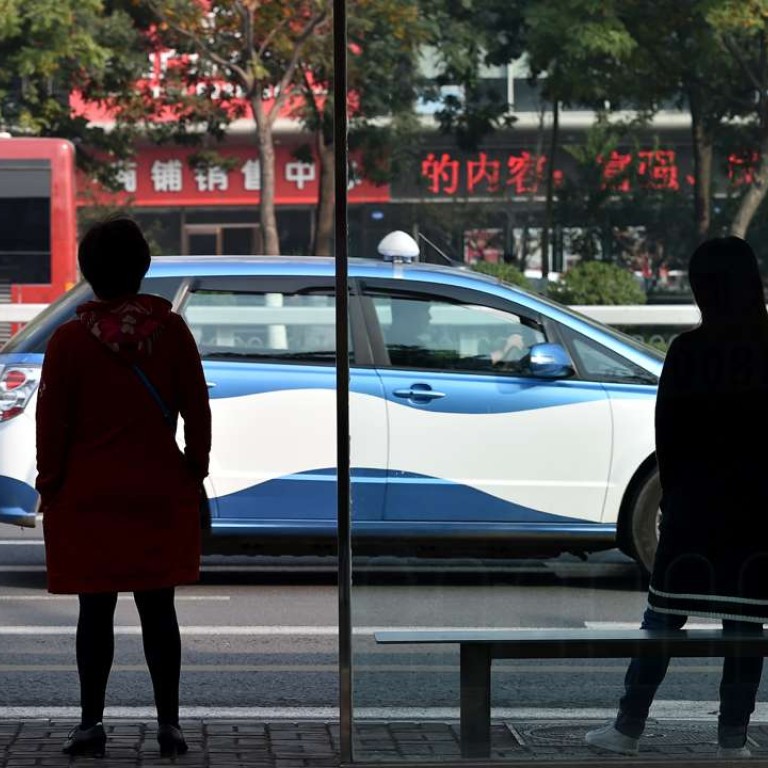
Chinese cities struggle to agree on rules for booming car-hailing app services
Only two cities have formalised guidelines amid complaints from the industry that proposed restrictions will force many drivers out of work
Transport authorities in China’s biggest cities are still struggling to reach consensus on final rules to regulate car-hailing services after draft regulations issued by the government a month ago sparked fears that they may suffocate the flourishing sector.
A directive with suggested guidelines issued by the central government started taking effect on November 1 and the period of public consultation on the issue ended over a week ago in major cities, but few have announced final versions of detailed rules governing the industry at a local level.
The requirement for cars and drivers to be locally registered, which would disqualify many of the present pool of drivers, has been the main point of contention and the rules are likely to be loosened by many cities, according to analysts.
Draft rules issued in Beijing, Shanghai and Tianjin last month stipulated that only drivers holding local hukou, or permanent household residency in their respective cities, plus operating vehicles registered with local number plates would qualify to operate car-hailing services.
This triggered complaints that it would bar many existing drivers from working.
Other cities have suggested less severe restrictions, but share similar limits on the type and condition of vehicles that can be used.
Only Hangzhou and Ningbo, two major cities in Zhejiang province, have so far issued final rules on overseeing the sector as the industry around the country voices strong opposition to suggested drafts.
Instead of requiring drivers to hold a local hukou or a residency permit for more than six months, as suggested in the draft rules, Hangzhou has included those who hold a temporary residency permit for 12 months, according to the final version released on Monday.
Ningbo kept the original suggested rule on drivers’ residency, but tightened restrictions on vehicles, requiring them to be purchased within two years instead of four suggested in previous draft guidelines drawn up by the city authorities.
Wang Chenxi, a transport service analyst at Beijing-based research firm Analysys International, expected very large cities to adopt stricter regulations to tackle serious traffic congestion and pollution.
“Mega cities like Shanghai and Beijing are more likely to adopt stricter rules on drivers and vehicles to protect the local industries because they face much worse problems,” she said.
Zhao Zhanling, a Beijing-based lawyer specialising in information technology, said the complaints raised by the industry were excessive. Large cities, however, were likely to make some compromises, although it may take more time for local governments to finalise their rules.

Didi Chuxing, the biggest industry player in the car-hailing sector with an 80 per cent market share, said in a statement that it has been actively communicating with local governments over the past three weeks to allow future growth in the industry.
The company, which took over Uber’s China operations in August, said last month the draft rules would damp public passion for entrepreneurship and innovation by taking away equal rights for employment for non-local residents and disqualifying most of the firm’s drivers in Shanghai and Beijing.
The head of a Hangzhou-based agency which has worked with Uber’s China team to develop and train drivers, who asked not to be named, said the suggested rules would be problematic for the industry.
“Unlike before, when a Mercedes-Benz owner would be willing to work on the Uber platform to make some pocket money because the subsidies were high, now with lower subsidy and more competition, most of the drivers are of a lower level and non-local. And most of the vehicles in use are low-end ,” he said.
Even before authorities intervened, the industry had already started eliminating weaker drivers amid fierce competition, he said. Over a year ago when he started his business he led about 2,000 driver accounts on social media, but that number had now shrunk to fewer than 100.
CAR Inc and Yidao Yongche, two other big players in the market, said on Monday they would adjust their businesses according to the new rules.
CAR Inc said their vehicles now in use mainly met the new suggested guidelines so any impact was limited.
Yidao said it had launched a series of measures such as driver background checks and more training to improve quality and oversight.

